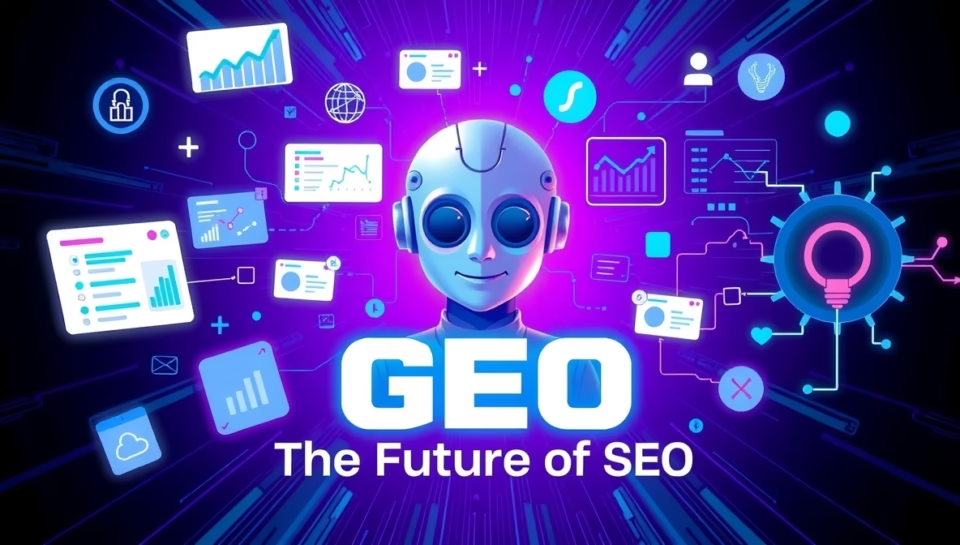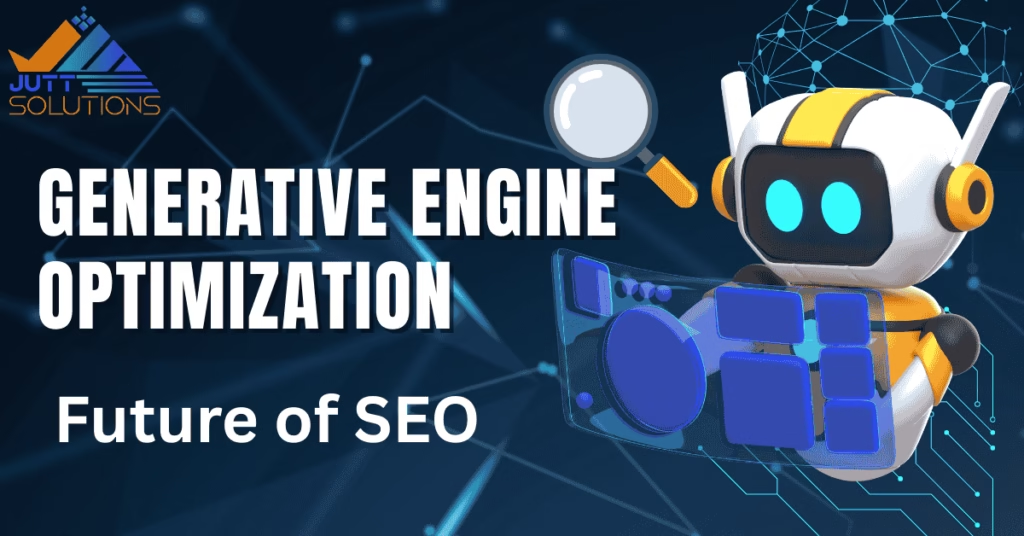
Generative Engine Optimization (GEO): Future of SEO
I would like to thanks to the current digital landscape, traditional search engine optimization (SEO) is being reinvented. ChatGPT, Gemini, Perplexity and other AI tools are becoming increasingly popular. Now there’s a new concept (or, actually a new term) coming up: Generative Engine Optimization (GEO). GEO stands for optimizing content for search engines, such as Google and AI systems. This guides giving direct, conversational responses. In this article, we are going to explore GEO. We’ll take a look at how it’s changing the game. Also, we’ll include some tips for leveraging it to stay ahead in 2025 and beyond.
What is Generative Engine Optimization (GEO)?
GEO, or Generative Engine Optimization, is a new type of optimization for making sure that your content is found and surfaced by AI-driven generative engines — tools that provide human/write responses to queries rather than a list of links.

While this sounds like SEO, GEO is different because:
• Selected for AI-generated answers
• Making data-readable for the machine
• How to make content available, credible, and properly referenced by LLMs (Large Language Models)
In a nutshell, GEO makes sure that when people leverage tools like ChatGPT to ask questions, your content — quote, summary or recommendation — is what gets delivered.
Why Generative Engine Optimization (GEO) Matters in 2025?
A huge change is underway, with AI tools — powered by models such as mine — woven into search engines and browsers:
• AI-generated: summaries show up before links in Google’s Search Generative Experience (SGE).
• Bing Chat, Perplexity, and Brave Search: AI answers come first, search results come second.
• ChatGPT: can browse the web and recommend products, sources, and services.
With more people looking for conversational search, GEO is becoming a must-have for:
• Brand visibility
• Traffic acquisition
• Own the voice of AI solutions
Generative Engine Optimization are also deciding what buyers purchase, the way educational content is delivered, the specialty drugs for which doctors research, and possibly the entertainment people watch. The opportunity lies not just in being visible, but in being trustworthy and quotable.”
Key Differences: SEO vs GEO:
| Aspect | Traditional SEO | Generative Engine Optimization (GEO) |
| Focus | Search Engine Ranking | Generative AI Output Inclusion |
| Goal | Top SERP placement | Mentioned in AI responses |
| Target | Google, Bing, etc. | ChatGPT, Gemini, Perplexity, etc. |
| Optimization | Keywords, backlinks, structure | Semantics, factual authority, clarity |
| Output | Link click | Instant answer |
SEO Optimization for Enhanced Visibility
Actionable Tip:
- Conduct keyword research focused on solar-related terms such as solar panel installation, solar energy benefits, and solar system financing.
- Create helpful, high-quality content that speaks to common questions and worries potential solar customers have for example the cost-effectiveness of solar power and environmental impacts.
How to Optimize for Generative Engines (GEO Strategies)
1. Create Structured, Fact-Based Content:
AI models favor:
• Direct, succinct responses to focused questions
• Structured Data (table format, bullet points, FAQ)
• Factual accuracy
Schema markup is great to mark content out for ai models. Use clear metadata, and make sure titles and subheadings align with query intent.

2. Build Authoritative Content:
When crafting responses, LLMs turn to high-authority sources. To boost your authority:
• Obtain links from reliable domains
• Cite, cite, sources, and expert opinions
• Keep content fresh with current data
Don’t simply repeat what we’ve all read before—contribute value with new research and industry-specific information.
3. Target Conversational Queries:
Think about how people ask questions in natural language:
Instead of optimizing for “best productivity tools,” optimize for “What are the best productivity tools for remote teams in 2025?”
Tip: Use tools like AlsoAsked, AnswerThePublic, or ChatGPT itself to find natural language queries.
4. Use First-Hand Experience and Unique Insights:
AI models prioritize:
Originality
Personal expertise
First-hand reviews, case studies, and insights
Google’s E-E-A-T guidelines (Experience, Expertise, Authoritativeness, and Trustworthiness) now extend to AI models too. Your personal insights can boost your presence in AI results.
5. Embed Your Brand in Answers:
When possible, use phrasing that allows AI to quote your brand directly:
“According to [Your Brand Name]…”
“In a recent study by [Your Brand]…”
This embeds your brand into the fabric of AI-generated responses, increasing recall and credibility.
6. Create Content for Featured Snippets and Summaries:
Even if you don’t rank #1, snippet-friendly content often gets pulled into AI summaries:
Use H2s for questions
Provide succinct 1-2 sentence answers right after
Generative engines love Q&A structures—make your content scannable and answer-driven.
7. Leverage AI Search Tools for Research:
Use tools like:
- Perplexity. Custom ai to view, what sources are being used.
- ChatGPT browser plug-in check how content is cited
- Google SGE preview (if available) – to learn about snippet generation
Even when it comes to AI tools, you can ask directly what sources they use and what your niche appears to be.
8. Diversify Content Formats:
Generative Engine Optimization adopt various formats:
• Videos (with transcripts)
• Podcasts (with summaries)
• Infographics
• FAQs
Focus on multi-modal content and cross-platform accessibility.
9. Optimize for Citation in AI:
Include:
• Clear source attribution
• Dates
• Author names
• Links to authoritative sites on the web
This makes you more likely to be seen as a reputable source.
10. Monitor GEO Analytics:
Since traditional SEO tools don’t yet track Generative Engine Optimization effectively, you can:
Use ChatGPT or Gemini to ask who they cite
Use Perplexity’s citations to see your presence
Track branded query volume to see if AI exposure is driving interest
You can also set up alerts for mentions and citations across AI tools using custom scripts or brand monitoring platforms.
The Future of Generative Engine Optimization (GEO): What to Expect

1. AI-Native Websites:
Sites will be created not just for humans but also for machine readers. Expect the rise of AI-friendly publishing platforms with built-in schema, citation logs, and auto-tagging.
2. GEO Ranking Tools:
Companies like Semrush, Ahrefs, and Surfer are developing tools to track GEO visibility, not just SERP rankings. Soon, you’ll be able to measure how often AI tools mention or source your content.
3. Voice Search + GEO:
With the rise of AI assistants, optimizing for voice-based conversational responses will become GEO 2.0. Expect a blending of voice search, GEO, and conversational UX.
4. Searchless Discovery:
In the near future, users may not even search. AI will proactively deliver content based on past behavior, preferences, and context. GEO will help you insert your content into that journey.
5. AI-as-Search Layer:
Generative tools will become the default search interface on mobile, in apps, and in wearables. Content creators will need to speak to machines first, humans second.
Conclusion:
Generative Engine Optimization — which is not a gimmick — represents a tectonic shift in how individuals will discover, consume and trust information online. Although conventional SEO is here to stay, you cannot ignore the fact that your content strategy has to adapt to stay relevant to the intelligent discovery tools of the future.
But tomorrow’s winning brands will not only rank; they will also resonate with the AIs that drive users’ choices.
Start preparing, get optimized, and get ready to join the revolution of conversational web.
Frequently Asked Questions (FAQs)
Is GEO replacing traditional SEO?
No. GEO complements SEO. (or inclusion in AI answers or) SEO vs GEO: SEO is about ranking, GEO is about inclusion in AI answers Both must be there for full visibility.
How can I know if my content is GEO-optimized?
It is best to ask AI tools questions that have something to do with your content. You are on the right path if they cite or mention you. Also, see if your content shows up in queries on Perplexity or ChatGPT citations.
Do I need special tools for GEO?
Not yet. But tools like Perplexity. tools like NameDrop, chatGPT, Google SGE preview, and AnswerThePublic provide a crude simulation of how generative engines process your content.
Can small businesses benefit from GEO?
Absolutely. With GEO, the smaller guys can jump over the multi-billion dollar marketing firms by providing better, niche-specific answers.
Will Google penalize GEO optimization?
No. Actually, GEO compliant content is often in line with Google’s E-E-A-T and user focused architecture. In short, all about content credibility and clarity.
Can GEO increase brand authority?
Yes. When you get cited in AI-generated answers, it reinforces your brand’s expertise, increases trustworthiness, and ultimately helps your long-term visibility.
What industries benefit most from GEO?
Any industry in which search, recommendations, or expert opinions on informational products matter:
• Healthcare
• Tech and SaaS
• E-commerce
• Education
• Finance
• Legal


7 Comments
Mano Billi
April 28, 2025Very informative and well-written blog!
You explained GEO (Generative Engine Optimization) brilliantly.
It’s clear that creating AI-focused content is the future.
Looking forward to more valuable tips from Jutt Solutions!
Jej jejo
April 29, 2025“Great insights on GEO! Clear, practical, and future-focused. Thanks for sharing
Amelia Amelia
April 29, 2025GEO is the future, and this blog explains it perfectly.
Loved the actionable tips and clear comparisons with SEO.
Well done, Jutt Solutions!
Muhammad Shoaib
April 29, 2025This article offers a compelling look into how GEO is shaping the future of search. The distinction between traditional SEO and AI-driven optimization is critical, especially with tools like ChatGPT and Gemini changing how users access information. I found the section on “AI-as-Search Layer” particularly intriguing—it really shows where content strategies need to evolve. Looking forward to seeing more practical tips on implementing GEO for small businesses!
Muhammad Shoaib
April 29, 2025This article offers a compelling look into how GEO is shaping the future of search. The distinction between traditional SEO and AI-driven optimization is critical, especially with tools like ChatGPT and Gemini changing how users access information. I found the section on “AI-as-Search Layer” particularly intriguing—it really shows where content strategies need to evolve. Looking forward to seeing more practical tips on implementing GEO for small businesses!
Padesi
April 29, 2025Insightful and forward-thinking article on GEO. The clear distinction between SEO and GEO, along with actionable strategies, makes it a valuable read. Great job!
Padesi
April 29, 2025Very informative and forward-thinking article on GEO. The clear distinction between SEO and GEO, along with actionable strategies, makes it a valuable read. Great job!